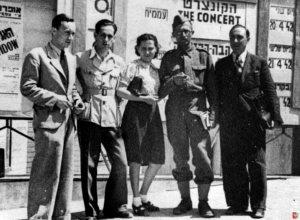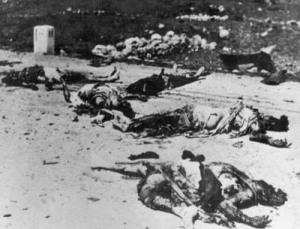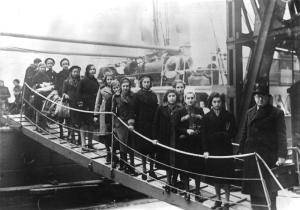
Charles Laffiteau
America can’t be an honest broker in the Middle East until we celebrate the full humanity of all God’s children.
By Alan Bean
As the body count mounts in Gaza, accusations of biased coverage, and corresponding denials, are piling up in America. Desperate to appear unbiased, mainline media outlets in the United States are working hard to provide equal time to both sides. As a result, “we stand with Israel” propaganda competes with evening news footage of mangled Palestinian children. The debate is being controlled by one-sided commentary that ignores the legitimate demands of both Israelis and Palestinians.
The deadly conflict between Israelis and Palestinians is mired in regional history. Unfortunately, Palestinians and Israelis preach irreconcilable versions of this history and few Western correspondents know enough to adjudicate the conflicting claims. Besides, why should the evening news bother with the detritus of yesteryear when there’s such wonderful footage of Hamas rockets, bombed out buildings, and grieving mothers?
I won’t attempt an exhaustive history of the Middle East in the 20th century, but will confine myself to three issues. First, the claim that the Palestinians of Gaza can’t be taken seriously because they embrace Hamas, a terrorist organization dedicated to the eradication of Israel. Secondly, how a virulent strain of near-universal Antisemitism made the creation of the modern state of Israel necessary. Finally, why America can’t serve as an honest broker in the middle east until “we stand with Israel” rhetoric is shelved in favor of a more cumbersome but more gracious slogan: “we stand with Israel and we stand with the Palestinians too.”
Hamas is a terrorist organization and Hamas is dedicated to the eradication of the state of Israel. You can’t get around it. But Hamas is not the first terrorist organization to operate in the Middle East; nor is it the most successful. Many of the founding heroes of the state of Israel were veterans of Zionist terrorist organizations such as Irgun and the Stern gang prior to 1948 and for several years thereafter.
The historical pencil sketch that follows relies on the research of Charles Laffiteau reflected in his helpful essay: Jewish Terrorism and the Creation of the State of Israel. A prolific researcher with eclectic interests, Laffiteau is a doctoral student at the University of Texas, Dallas who writes a bi-weekly newspaper column “The Bigger Picture” for the Metro Eireann newspaper in Dublin Ireland. The paper on Jewish terrorism summarizes research on the subject from a wide variety of perspectives.

Menachem Begin with Irgun comrades in 1948
Zionist groups such as Irgun and the Stern Gang used the tactics of terror for two primary purposes. First, they wanted to lure the British, who controlled the Middle East until 1948, into a response sp brutal that the non-violent majority within the Zionist community would embrace violence. Secondly, terrorist attacks on Arab settlements were designed to spark a mass exodus of refugees that allowed Jewish settlers to seize new territory.
In perhaps the most shocking incident, Zionist terrorist groups attacked the Arab village of Deir-Yasin in 1948, killing at least 120 men, women and children. Significantly, this outrage was denounced by most Jewish citizens in Israel including a number of leading rabbis.
Hamas uses this history of Israeli terrorism to justify its own use of terror. If violence was used to illegally seize Palestinian territory, the argument goes, Hamas is justified in using violence to root out the occupiers.

Victims of the Deir-Yasin massacre in 1948
Pro-Israeli opinion leaders use a semantic slight of hand to reject this conclusion. Men like Menachem Begin were “guerrillas” or “freedom fighters”, not terrorists, their defenders say. This is a distinction without a difference. Hamas uses terror for the same reasons that Zionist groups like Irgun and the Stern Gang used terror sixty years ago. Hamas wants to goad Israel into precisely the kind of brutal reprisals we are witnessing today in Gaza. Every time the Israelis destroy a mosque, a hospital, a school or a home, sympathy for the Palestinian grows and Israel’s reputation in the international community is diminished.
In this sense, the Israeli argument that Hamas is responsible for the devastation of Gaza is partially justified. Great Britain pulled out of the Middle East (and India) because these regions could only be held with the sort of extreme violence we are witnessing in Gaza.
But there is a fundamental difference between Israel in 2014 and Great Britain in 1948. The Israelis can’t pack up their toy soldiers and sail for home. When Palestine was partitioned into Arab and Israeli territories in 1948, the new Israeli homeland had to come at someone’s expense. It was a zero-sum game in which every Israeli gain came at the expense of the Palestinians.
There can be no way forward in this conflict until both sides renounce violence. The United States can’t pass “we stand with Israel” resolutions and broker an honest peace at the same time. Until the international community, with strong leadership from the United States, asserts that both Israel and the Palestinians have a right to self-determination, progress in the region is impossible. Neither side will budge an inch so long as rockets are being launched from Gaza and innocent children are being ripped apart by Israeli mortars.

In 1938, the St. Louis, a ship holding 1,000 Jewish refugees from Germany, attempted to dock in Florida. The passengers were fleeing their homeland in the wake of the Nazi Kristallnacht (“the night of broken glass”). After being refused entry in Cuba, the ship moved on to Florida. But the American government refused to grant refugee status to the desperate men and women on board. It was the heart of the depression and Antisemitism was rampant in America. A nation that had opened its doors to Jewish immigrants fleeing pogroms in Russia, Romania and Poland in the 19th century underwent a dismal change of heart following WWI. The height of KKK-style racism, Antisemitism and xenophobia was in the Roaring 20s.
Between 1933 and the end of WWII in 1945, only 132,000 Jewish immigrants were allowed to enter the United States–that’s just over 10,000 per year. Once the holocaust began in earnest, there was little countries like Great Britain, Canada and the United States could do to help Jewish citizens in Nazi-controlled countries. But we could have helped in 1938 and we refused.
By the end of WWII, fewer that half a million Jews remained in Europe and, like the people of Gaza today, they had nowhere to go. The dramatic events of 1948 changed all that. Between 1948 and 1951, 687,000 Jews emigrated to the new state of Israel, half of them coming from Europe. American support for Israel was grounded in an odd kind of relief. Finally, holocaust survivors had somewhere to go, and that somewhere wasn’t America.
Even in 1948, despite the ravages of Antisemitism, European Jews were seen as an educated and resourceful people who were far more civilized, advanced and sympathetic than the Arabs of Palestine. In short, they were recognizably human.
Times have changed, of course. As Will Herberg pointed out in 1983, Roman Catholics and Jews have gradually emerged as Americans in good standing. Unfortunately, other people groups have yet to make the cut.
The cold refusal to welcome the Jewish refugees on the St. Louis in 1938 is mirrored in our day by a seeming inability to reckon with the humanity of the children at our borders. Those who wish to send these children back to the horrors of rape can’t empathize with people they regard as substandard, retrograde and alien. All people are equal; but some appear to be more equal than others.
And so we find leading representatives of both major parties bragging about their support for Israel on Facebook while demanding that the border children be dispatched to their home countries without delay.
Have we come to grips with the full humanity of both Israelis and Palestinians? Can we feel for the children at our border as if they were our own flesh and blood? Some of us can, but not enough of us to make the critical difference. Before we can serve as an honest broker in the Middle East we must celebrate the full humanity of every man, woman and child on the face of God’s good earth. Only one mantra will suffice: “We stand with Israel . . . and we stand with Palestine too”.
